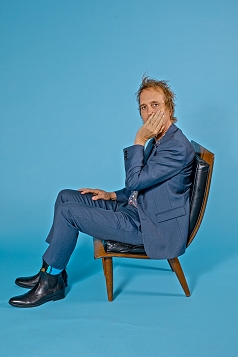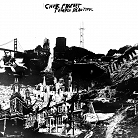
Paste
Not since Lou Reed paid homage to the city and era that forged him with New York has there been a song cycle dedicated to a place and reality that offers the core immediacy with the thump, churn and ferocity of Chuck Prophet’s Temple Beautiful. It’s a stripped-down rock ‘n’ roll record where the drums pump and echo, guitars slash and buzz, horns squawk like geese with rhythm, and the former wunderkind of progressive cosmic cowboys Green On Red bristles with an intensity that makes great rock burn.
More than anything—even the punk aggression, the unadorned arrangements that slice to the core, the voice that tears through layers of guitars, bass and drums—there’s a far-flung Americana at work. Named for Jim Jones’ San Francisco-based temple, the title track is all marching band pound-down, while the strummy electric guitar-basted “Castro Halloween” evokes the sweetness of Alex Chilton’s power-pop and the promise of holidays burning off to leave the wistfulness of what is. The post-Western “I Felt Like Jesus” is equal parts Clint Eastwood and Azetec Radio, xylophone flourishes popping around the melody.
Noir machismo that’s so pulp West Coast pushes the flat rock of “Who Shot John,” and the Paisley Underground scene of LA in the ’80s sweeps through the character sketch “He Came From So Far Away,” ethereal background vocals falling in sheets and whispering the details of an illusionary life that may or may not be what is presented.
It is the details that make Prophet explode. Loping through a strtaight-forward midtempo— lacerated with bits of twangy guitar—of “Willie Mays Is Up At Bat,” it’s an afternoon painted vividly, a conflict torqued and bravado bristling in the seemingly ordinary moment. Not quite Bukowski, the tale has a beat poetry sensibility that honors San Francisco’s City Lights Bookstore, and enough rising and falling “ohhhhOOOhhhoooHHHohOH” chorus to make Legionnaires of us all.
That is Prophet’s vexation: maintaining the innocence in the knowing. “Little Girl, Little Boy”—featuring wife Stephanie Finch—is pure ’50s swoon via Ramones nostalgia to keep it from Sha-Na-Na-ery. Even more retrofit is “White Night, Big City” that scrapes Blondie-esque punk doowop for its essence.
Still, it’s Lou Reed who keeps flickering. With the pounding, half-barked “Play That Song Again,” it’s a more likable “Sweet Jane”/”Walk On The Wild Side” hybrid, also suggesting Alejandro Escovedo’s Real Animal, which Prophet co-wrote—and the slow-mourn blues of “Emperor Norton” that is an unsentimental caution, Prophet channels Reed’s pervasive urban edge without overwhelming his own voice.
by
Holly Gleason
on
February 8, 2012

NPR
Chuck Prophet's 'Beautiful' Homage To San Francisco
Chuck Prophet’s new album, Temple Beautiful, takes its name from a former synagogue that hosted punk-rock shows in the late ‘70s and early ‘80s; it was next door to the temple overseen by cult leader Jim Jones. That may sound like a grim or black-humored reference point around which to erect an album, but with Prophet, grimness, humor, fact and fiction mingle freely. Before anything else, he’s a guitar player with a melodically nasal voice whose phrasing favors the whimsical and the querulous.
Over the course of this album, Prophet takes you on a tour of San Francisco as he’s lived and dreamed it, watching Castro Street Halloween parades, the famous local stripper Carol Doda and the San Francisco Giants-era Willie Mays. Prophet says his album is filled with “Google-free” facts and non-facts to suit the mythology he wants to create about the city he’s so fond of.
One of the ways Prophet achieves tension and release in his songs is by contrasting the content of the lyrics with the tone of the music. Take, for example, “White Night, Big City,” about the 1978 murder of San Francisco supervisor Harvey Milk and the riots that followed the trial of Milk’s killer, Dan White. Prophet frames his version of that narrative with a song that has a jaunty melody, a refrain featuring doo-wop harmonies and openhearted compassion. The result is music whose ironies aren’t cheap ones.
Ultimately, you can listen to Temple Beautiful for the superficial catchiness of its tunes, Prophet’s slashed guitar chords and his searching, keening vocals and have a good time. And if you want to, you can listen more closely to what he’s getting at on this album, and experience the album as one man’s alternative history of three decades of West Coast culture and politics. All that, plus a few awfully good songs about having your heart broken.
by
Ken Tucker
on
February 8, 2012
Magnet
W&A With Chuck Prophet
On his 10th studio album, Temple Beautiful (Yep Roc), Chuck Prophet found his muse in the city he’s called home for 30 years. Exploring the local landmarks and myths with friend and poet klipschutz, Prophet winds his way through San Francisco, stretching tales even taller along the way. But this guided tour isn’t a detailed and prefabricated concept album, so much as it’s the product of spontaneous inspiration, and it’s not a document of the city’s past as much as it is of its present. MAGNET caught up with Prophet to explore some of the things that inspired the making of Temple Beautiful. Prophet will also be guest editing magnetmagazine.com all week.
MAGNET: Temple Beautiful has been dubbed your “ode to San Francisco.” What inspired this album-length exploration of the city?
Prophet: I was writing songs with a friend of mine, Kurt; his pen-name is klipschutz. We were just kind of messing around, really, and we tapped into this vein where I was just like, “This could be a San Francisco record.” And that’s really it. It kind of floated to the top, then once we tapped into that, everything started flowing.
I know ¡Let Freedom Ring! had a bit more of a political tone or thread. Do you feel like giving yourself these sorts of conceptual frameworks helps the album come together?
Yeah, for me it does for sure. I know some things about writing songs. I know how to put things together. But really, I’m kind of in awe of the whole process. Mostly, I feel like I don’t know anything, so I guess it helps to be pushing an idea along. Then it’s like, you have an idea in a room with somebody, and you’re playing some chords, and you’re shouting at the walls and bouncing sounds around, and, you know, somebody says, “Well, we’re going to have to see if Willie Mays will show up in one of these songs.” That’s kind of the way it goes, you know.
Is it a deliberate thing for you, to come up with an idea for the record before you start really getting into the meat of the song?
I mean, I can write songs, like love songs or relationship songs or whatever. But I feel like at some point something emerges. At some point you stand back and squint and say, “Well, this is kind of where this record’s going.” I dunno. Maybe it’s something you figure out when the record’s done.
I wonder sometimes, too, how much is just critics projecting.
People only have so much time. So, if somebody says that they went to Alaska and lived in a teepee for a year and wrote these songs, that might be the best way to describe it. I really don’t know. I know that when we tapped into the spontaneity and the kind of energy that brought me here in the first place, then we had songs I was excited about. I guess that’s it. And you gotta understand, too, I was born in Whittier, Calif. I was born only a few miles from where Nixon had his first law office, and for all intents and purposes, I should probably still be down there pushing a lawn mower or something. I didn’t really grow up very culturally aware, so most of it came from listening to records and stuff. I started traveling, then when I moved to San Francisco I started getting my own sort of self-education in different people of different races and colors and sexes and shit, punk rock and arty stuff. For me, coming here kind of opened my eyes. When we tapped into that, I felt like we were tapping into something I could get excited about.
When did you move to San Francisco and what brought you there?
I basically moved here to go to college in the early ’80s, and I never left.
How many of the characters in the songs are real? I recognized a lot of the places, or have found out about them after hearing the songs, but how much are the people in there actual people of San Francisco?
We kind of leaned a little more toward the mythological side of things, but, I mean, Willie Mays is very real. There’s also a whole host of characters on the record, from the Mitchell Brothers to Redman to Jim Jones—a lot of people who probably wouldn’t be caught dead with Willie Mays, or Willie Mays probably wouldn’t be caught dead with them. We knew he was going to be on the record somehow, and he’s a very real person, and he’s sort of the hero of the record. He’s a kinda quiet guy, and he’s a man of substance and stood up to racism. There’s probably a lot of thick books written about him, but all we knew about him is that he always swung for the fence.
The reason I ask is I read an interview from January, where you’d said, “I’ll always take the myth over the truth.” When you’re writing creatively, that’s always kind of what you’re doing, shaping the truth or the memory, but do you see mythmaking as part of your goal in writing these songs?
No. Well, if you’re lucky, sure. I’m trying to think of the guy from the Silver Jews (David Berman). He has an expression that somebody told me. He calls it “Google Pure.” If you can Google something and not find it, and it doesn’t come up anywhere, he calls it “Google Pure.” A lot about this record is sort of “Wikipedia Pure.” We didn’t really know. We were definitely in a woodshed when we wrote the songs, in the sense that we didn’t have any Internet. Even a song like “Castro Halloween,” that we snuck out about the parade that happens really only a couple blocks from my apartment every year, I thought two people were killed, but it turns out that really two people were shot and nine people were injured. The first line of the song is “When the shots rang out/And two men died,” so somebody corrected me, like, “Actually, Chuck, you know, nobody died.” Spoilsports.
That’s how storytelling works, though. Through memory or accidents things change and become something new.
It’s also rock ’n’ roll; it’s not journalism. Sorry. Sorry you got the short end of the stick when it comes to the fun.
I was interested to see that you had done some gigs playing London Calling front-to-back. That’s been one of my favorite records forever because there’s so much variety in it. It seems like maybe that’s an attribute you value in your music.
Oh, absolutely. I think that the Clash are very roots rock and world music and all that stuff with London Calling. For me, prior to that, punk rock was pretty narrow, and that record showed what was possible. I still feel like that’s probably the record I’ve been trying to make, in many ways. They were just discovering American jazz and rockabilly and ska, and they had a deep well of music history that they were drawing from, and they dipped their bucket down into that well, and they weren’t afraid to drink it. Even if you listen to “Train In Vain,” which was a very contemporary-sounding track at the time, they weren’t afraid to play with disco, which was really just contemporary black music. It’s an adventurous record. I think if it wasn’t a direct influence on me, it at least showed me what was possible.
You’ve worked with a lot of people. Whether helping Sonny Smith put out a record or helping Alejandro Escovedo write one or playing guitar with god knows how many folks at this point. How important is collaborating, and getting fresh insight from people?
I like it. I appreciate writing songs by myself, but I sometimes like having somebody in the room with me. With somebody like Alejandro or klipschutz, it’s easy company. It’s probably also my social life, in a lot of ways. What I like is I like a shared experience. I’ve been playing with my wife, and I’ve been playing with my friends, and that’s why I got into playing music. I didn’t really get into music to be by myself. I like the shared experience, and I think that’s something that helps me to work with other people.
Would you say that you’re actively searching for new sounds and new influences?
I don’t know if I’m actively doing much of anything really. I have a pretty healthy appetite for music, so yeah I like to listen to records.
You’ve complimented the new crop of garage/psych bands in San Francisco, bands like Thee Oh Sees, Girls and Fresh & Onlys. What about that do you relate to, or find inspiring?
I like to see people playing guitars and making noise with their friends. It’s inspiring to see a new crop of bands from my hometown. And just the energy of it, I really like. It’s inspiring because there’s energy and that thing, you know?
Do you feel like you’re, by virtue of being in the same place, a part of that in any way?
I don’t know. Like I tell people, I’ve been duct taped back together so many times I don’t even know what I’m a part of. I’m probably not a part of it. They do their own thing. When Green On Red was playing ‘60s music and into psychedelia and stuff, that was just our way of saying fuck you to everything else that was around, and that’s pretty healthy, I think … In a lot of ways, the money ruined everything in the ‘90s. Money makes people stupid. I think a lot of bands around here got signed, and I think there were these unrealistic expectations, and there were a lot of bands that ended up signed to major labels in the wake of all that, when the music business model was just massive. I didn’t think of that as an inspired time, but now I see people recording records in their closets and people building studios in their basements, and people making records with just the sheer desire to do it. I think that’s always really inspiring.
With Temple Beautiful, what would you hope people hearing it get out of it?
I’d hope they didn’t need an owner’s manual to get into it. I hope that when it hits you, if you like rock ’n’ roll, that it’ll speak to you.
—Bryan Reed
by
Bryan Reed
on
February 6, 2012
San Francisco Chronicle
New Chuck Prophet album draws on 30 years in S.F.
Chuck Prophet’s new album, “Temple Beautiful,” is an earnest if not entirely factually accurate tribute to his adopted hometown of San Francisco. The former Green on Red front man sings about well-known characters, places and events that have shaped his life here for 30 years. He’ll celebrate its release with a March 30 gig at one of his favorite venues, the Great American Music Hall. Prophet is also offering a handful of fans the once-in-a-lifetime opportunity to ride with the Temple Beautiful San Francisco Bus Tour on Tuesday (sign up at www.yeproc.com), the album’s release date, with KGO DJ Peter Finch as guide. We talked to Prophet, 48, at his home in the Castro.
Q: Who came up with the great idea of promoting “Temple Beautiful” with a bus tour?
A: My label Yep Roc wanted to do a record- release party at a club or something. I said, “Guys, this isn’t my first record. I can’t do that. It’s like a third wedding.” So we came up with the bus idea. I thought, even if we did the N-Judah line, that would take us from the Willie Mays statue to the beach. But they said, no, we’ll get you your own bus.
Q: So what kind of stuff are you going to show people?
A: We’re going to take people by the liquor store where Janis Joplin bought her first bottle of Southern Comfort. When the store ran out of its stock of Southern Comfort, Janis squatted on the floor in protest and pretended to urinate on the carpet until they got her one.
Q: Did you get that information from Wikipedia?
A: Everything about this record has been Google free. There’s a lot of stuff where we took the myth over the truth.
Q: You mean how the Red House Painters wrote a song about “Grace Cathedral Park” when it’s actually called Huntington Park?
A: Yeah. We’re going to drive by Grace Cathedral and say that it was the Grateful Dead’s house. There’s a thing on the album about Castro Halloween where I sing that two people got shot and killed. Everyone tells me that actually nine people were injured. I need to get a fact checker next time.
Q: So you’re basically just going to mislead people?
A: Not really. It’s kind of a love letter to San Francisco. It’s not always pretty. Things just flowed. It’s a place where everybody comes from somewhere else. It’s 7 miles long and there are probably 27 different San Franciscos that overlap.
Chuck Prophet: 8 p.m. March 30. $18. Great American Music Hall, 859 O’Farrell St., S.F (415) 885-0750. http://www.gamh. com.
February 5, 2012
Little Stephen’s Underground Garage
The title track from Chuck Prophet’s upcoming release, “Temple Beautiful”, has been selected as one of Little Steven’s “Coolest Songs In The World” on his radio program Underground Garage. Underground Garage is syndicated on over 100 radio stations nationwide. Click here for an affiliate near you.
February 5, 2012
Huffington Post
A Conversation with Chuck Prophet
Mike Ragogna: Hi Chuck. What was your plan approaching your new album Temple Beautiful?
Chuck Prophet: I knew I wanted to make a rock ‘n’ roll record, a guitar record, and then somehow, I got the idea of digging into the local lore of San Francisco, which is endless. I was writing with my friend Kurt, aka, Klipschutz, and when we tapped into that, the ideas began to flow. On a good day, an idea might actually grow up into a song. Ultimately, we leaned on the more mythical side of the street.
MR: San Francisco must mean a lot to you.
CP: San Francisco means a lot to a lot of people, and yeah, I am one of them. I mean, everybody comes here from everywhere for all the obvious reasons, and some maybe not so obvious. There are so many different cities packed into seven square miles, and they intersect and overlap. I guess you could say I wasn’t very culturally aware when I was growing up in Richard Nixon’s hometown. Then I moved around. Ended up in San Francisco going to school. Joined a band. Started to travel, saw some things. Fast forward a little and here I am. What I mean to say is that San Francisco is an education. It’s an education on different kinds of buildings, food, people, races, colors, sexes and the like. It opens your eyes.
MR: How did you assemble the cast of characters that appear with you?
CP: Once the songs were there, it fell together. I played guitar on a session where the drummer was Prairie Prince. He had that feel, you know? So I reached out to him. He’s got experience to burn and he still plays like a teenager. So that was the groove. Very teenage. James DePrato plays guitar in my band and together, we know how to make it sound like one big guitar. Rusty Miller played bass. And Stephanie Finch, my wife and long time partner in crime, brought her thing—singing and playing some keyboards here and there. Brad Jones produced and engineered. It’s a much less layered record. The guitars are pretty graphic. Even the cover art is just black and white. Honestly, I was pretty confident with the songs and just didn’t feel the nagging need to add more than that.
MR: This is your twelfth album, and many of your contemporaries haven’t made it past half of that. What’s your secret?
CP: No secrets. I guess I’m lucky that I’ve been able to stay interested in the whole thing. Writing songs and making records and kicking the songs around on the bandstand. There have been times where I wasn’t that excited and it showed. There are other things to do. I’m trying to get some hobbies in fact. Yeah, anyway, to wake up excited about what you’re doing is a gift, I suppose.
MR: Q Magazine said you are “... a sparky songwriter worthy of greater attention.” Mojo said, “Prophet delivers with quixotic swagger and declamatory sneer.”
CP: Yeah, that sounds pretty good. I’ll take it. I’ve been known to write my own blurbs, but that one is cool. Thanks for not choosing some of the others, by the way. I need the love. Every time I’m done making a record, I suggest that the promotional department gather in a circle, join hands and pray. Then we dig up some old quotes for the bio, book gigs anywhere anyone will have us, and hope for the best. My records have never really sold that much. I guess I should feel bad about that? I’m sorry I brought it up.
MR: (laughs) In your opinion, how does your music these days compare to your Green on Red days?
CP: Not that much different. Dan Stuart and I were always looking for trouble. And I guess I’m still out there standing over steaming manholes.
MR: What are your thoughts about the old Paisley Underground versus these days?
CP: A lot of great music came out of that time. If you look at what was on MTV or the radio, it’s amazing that we got record deals. I think The Bangles really ran with it, and I hear they’re still making great music and have a really great live show these days. I wanted to go see them play at The Fillmore recently, but I missed them when they were in town. But the scene… I don’t know. I think it was pretty short-lived if you think about it. But those years in a van with Green On Red were wild. No one knew where they’re next big chunk of hash was coming from. Now, I’m into lunch. Speaking of which, mind if I give a shout out to Split Pea Seduction on 6th Street? There might be a free crostata in it for both of us!
MR: (laughs) Thanks. Okay, “Willie Mays Is Up At Bat” must speak to the baseball fan in you? What’s the story behind that song?
CP: I’m all for the Giants. No matter what, actually, I always root for the home team. For the album, though, we knew we needed a hero. Any myth needs a hero. And you can’t beat Willie Mays. Talk about larger than life. I mean, at the downtown stadium, there’s a bronze statue of him 10 feet tall. The greatest center fielder that ever lived. Of course we had to go and mix him up with a bunch of characters he wouldn’t be caught dead with.
MR: Such as?
CP: Oh, you know, Carol Doda, Laffing Sal, Bill Graham, Jim Jones, Bugs Bunny, Daffy Duck—that crowd.
MR: (laughs) Can you also go into the story behind “Castro Halloween”?
CP: The Castro District is world-famous, isn’t it? And Halloween there tends to be a party and a half and lasts ‘til dawn. I live four or five blocks away, leading my quiet married existence, watching reruns of The Wire when the biggest dress-up party west of Berlin is in full swing. The song triesto bottle some of that magic and then set it free. I think my guitar solo at the end is longer than all the verses put together. It was hard to fade it.
MR: How often do you feel like Jesus, you know, like the song with that title?
CP: Not often enough. That one is dedicated to the Albion, which used to be on the corner of an alleyway off 16th Street, in the Mission District. There was a backroom for music. It was a dive. It was a firetrap. It was heaven. We used to play in that backroom. Sometimes for like four nights in a row. And it was magical. It was a scene that only lasted so long. The title of the song refers to the way I felt when I met my wife and she looked at me that “special way.” Stephanie used to play the upright piano back there and sing the best harmonies. I always liked the sound of our voices together. Made me feel bigger than life.
MR: Can you go into Emperor Norton, who he is and why you wrote a song in his voice. Maybe people outside of San Francisco might need a little help.
CP: Compared to overseas, this whole country is still pretty new on the block. San Francisco wasn’t founded ‘til the mid-1800s. Emperor Norton came to town and proclaimed himself an Emperor and never paid for another drink or meal in his life. We tried to steer clear of him as a character on the record, but he insisted. And who were we to say no?
MR: Your songs were recorded by Heart and Solomon Burke. What did you think of the recordings?
CP: I love those covers. The song Solomon Burke cut, I wrote with Dan Penn. When I got a copy, I went over to Dan’s and we listened to it together. Solomon did these off the cuff ad libs at the end and I remember Dan really vibing on it. We listened to it a few times. It’s hard to top hearing Solomon Burke sing a song you did with Dan Penn! Heart was great as well. That song “No Other Love,” it only has about three lines of lyrics to it, and it’s been maybe my most popular song. Ann Wilson really sings it. And it’s pretty awesome. She is something else. Like a female Elvis or something.
MR: “No Other Love” was also included in the film P.S. I Love You. What did you think of how it was used?
CP: The film was a pretty forgettable chick flick. But people really responded to that scene, particularly young Latinas. So that’s been really cool. The film really connected with young girls full of that romantic longing. I think that it was real nice.
MR: What’s it like having your music on Californication and Sons Of Anarchy?
CP: It’s like money in the bank! Literally. And I like all those shows. So it’s about as win-win as it gets.
MR: You recorded with Warren Zevon. I imagine you were a fan. Do you miss him?
CP: I barely knew him, but yes, I did play on Life’ll Kill Ya, one of his later discs. I was a fan, am a fan, and can’t imagine I’ll ever stop listening to his songs. I’m sorry there won’t be any more of them. He was a tough character for sure. He had an incredibly quick wit. And you wouldn’t want his caustic wit pointed at you. He could be a cantankerous guy, but also very charming and always funny. At the time, I worried about his Mountain Dew intake. He’d show up in the morning with a grocery bag of cans… he was drinking like a case of it a day. And when he ran out, he’d get these splitting migraines.
MR: What advice do you have for new artists?
CP: Heck, I don’t know. Nikki Sudden once told me that Keith Richards told him that coffee is the absolute worst thing you can put in your body. Seriousness aside, I honestly don’t have any advice for anyone. I suppose if anything, pay attention. Try to be on time. Honor your commitments. Don’t waste other people’s time, especially the audience.
MR: What does your tour schedule and future look like?
CP: We’re gearing up for some quality time in the van. “Van Therapy,” we call it. The year is filling up fast. As to my future, is it okay if I pretend you didn’t ask that?
MR: Ask what? (Laughs.) Thanks so much for taking the time to be with us.
CP: My pleasure. Thanks
Tracks:
1. Play That Song Again
2. Castro Halloween
3. Temple Beautiful
4. Museum Of Broken Hearts
5. Willie Mays Is Up At Bat
6. The Left Hand And The Right Hand
7. I Felt Like Jesus
8. Who Shot John
9. He Came From So Far Away (Red Man Speaks)
10. Little Girl, Little Boy
11. White Night, Big City
12. Emperor Norton In The Last Year Of His Life (1880)
February 1, 2012
The Line Of Best Fit
Nobody harneses the distinctive sound of a Fender Telecaster quite like Chuck Prophet and, as the opening chords of ‘Play That Song Again’ ring out with an undeniable twang, Prophet starts Temple Beautiful with a statement of intent from the off. His most focused and concise work in years, Prophet’s twelfth studio album is ultimately an open love letter to San Francisco – filled with gut wrenching guitar licks (‘Castro Halloween’ / ‘Who Shot John’), classic Dylan-esque phrasing (‘Play That Song Again’) and gorgeous analogue production (‘He Came From So Far Away’) – Temple Beautiful harks back to the raw pomp and swagger of 1997′s Homemade Blood and sheds the daliances with synths and samples that have perhaps crowded the past few releases. A return to form, some would say.
February 1, 2012

No Depression
Temple Beautiful (YepRoc, release date 2/7/12) is a rock and roll concept album that delivers a twelve track homage to San Francisco as seen through the eyes of adopted son and singer/songwriter Chuck Prophet. Chuck describes his latest recording as “made in San Francisco by San Franciscans about San Francisco” but he’s not serving up Rice-A-Roni or riding cable cars and you won’t find most of Temple Beautiful in your California history books. Yeah, pre-steroid era hero Willie Mays, martyr for gay rights Mayor Harvey Milk and the devastation of AIDS on the city appear in song but more often than not Chuck honors the quirky fringe even as he sings of the “heart of the heart of the city.”
The colorful cast of characters includes San Francisco eccentrics Emperor Norton and the Red Man to the porn producing Mitchell Brothers of Behind The Green Door fame and the silicone enhanced exotic dancer Carol Doda who shocked San Francisco in the 1960’s when she “showed us everything she had and then she showed us all a little more” as America’s first topless and then first bottomless dancer. With a tip of the hat to Jimmy Reed’s “Bright Lights, Big City”, “White Night, Big City” is Prophet’s tribute to Harvey Milk who was assassinated by “a little man in a fit of rage.” Prophet adds a call and response and doo wops to “White Night” that makes you wonder if Chuck’s considered transforming Temple Beautiful into musical theatre for his beloved city. “The Hand Left Hand and the Right Hand” begins with the Mitchell Brothers and then references one or more pairs of feuding musical brothers who have not (yet) committed fratricide as Jim Mitchell did when he shot and killed brother Artie.
On the upbeat vaguely Wrong ‘Em Boy0-ish “Little Girl, Little Boy” Stephanie Finch sings a duet with Chuck on the most playful track on the disc. You’d expect Chuck might have spent some time in bars during his time in the city and two of his former favorite hangouts are highlighted. The Albion Bar and Temple Beautiful (the bar was previously the Peoples Temple of Jim Jones infamy which is both cool and creepy) are paid tribute as Chuck recalls the clubs and concerts of his youth. No history of San Francisco would be complete without a mention of Castro Street: a street that symbolized both liberation and excess with its annual Halloween party. Little Steven named “Temple Beautiful” his “Coolest Song in the World” on an Underground Garage broadcast. Enough said. What can I add to that?
In this age of MP3 files, Spotify and nonexistent or unread liner notes casual fans may be unaware that Chuck co-wrote and played guitar on all of Alejandro Escovedo’s Real Animal (2008) as well as co-writing half the songs on Street Songs of Love (2010). Add his political solo disc Let Freedom Ring (2009) and this year’s more personal Temple Beautiful and I can’t think of a more productive songwriter of quality tunes over the past three years. If you’re a fan of complete albums, big guitar and great lyrics you need a copy of Temple Beautiful. The only thing I don’t like about Temple Beautiful is that I won’t be in San Francisco on February 7th to take Chuck’s Temple Beautiful San Francisco Bus Tour!
February 1, 2012
Temple Beautiful
CHUCK PROPHET RELEASES TEMPLE BEAUTIFUL ON YEP ROC RECORDS FEBRUARY 7, 2012
TWELFTH STUDIO ALBUM PAYS HOMAGE TO SAN FRANCISCO
CAST OF CHARACTERS INCLUDES WILLIE MAYS, THE MITCHELL BROTHERS, JIM JONES, RED MAN, DAN WHITE, CASTRO DISTRICT, EMPEROR NORTON AND MORE
NATIONAL TOUR TO BE ANNOUNCED
“…a sparky songwriter worthy of greater attention.” Q Magazine
“Prophet delivers with quixotic swagger and declamatory sneer.” MOJO
With “his triple-threat ability—excellent songwriter, killer lead guitarist, charismatic frontman”—(AOL Spinner), California native and longtime San Francisco resident singer-songwriter Chuck Prophet pays homage to the city he calls home for his twelfth studio album, Temple Beautiful. Set for February 7, 2012 release on Yep Roc Records, the album is named for the ill-fated club of the same name, “Temple Beautiful is a long closed punk rock club located in the old Reverend Jim Jones’ People’s Temple. Where I saw my first gigs,” says Prophet, who co-produced the album with Brad Jones. “This record was made in San Francisco, by San Franciscans about San Francisco.”
Co-written with klipschutz (AKA klip) at Prophet’s “non-internet-having office space,” the 12-track album’s odes include “Castro Halloween,” “a gleaming, breezy rocker, anchored by Prophet’s everyman voice” (SF Weekly), “Willie Mays Is Up At Bat,” “Emperor Norton in the Last Year of His Life (1880),” and the title track which boasts Roy Loney, vocalist of legendary Bay Area band The Flamin’ Groovies, on guest vocals.
Compelled to pay tribute to the history and weirdness that brought him to the city nearly 30 years ago and inspired by current San Francisco artists, Prophet entered the studio with James DePrato (guitars), Rusty Miller (bass, vocals) and The Tubes’ Prairie Prince (drums, percussion) to record “an unsentimental (though loving) tour of San Francisco,” says Prophet. “My effort to tap into the history, the weirdness, the energy and spontaneity that brought me here in the first place. All the songs are San Francisco related somehow.” The album also features Stephanie Finch (vocals); Chris Carmichael (cello, violin); Jim Hoke (woodwinds, flute).
At 18, Prophet joined the seminal Green on Red and soon became one of the driving forces behind the cult heroes and the influential L.A. Paisley Underground scene in the 1980s. During his eight-year run with the band, he cut a major-label album with producer Jim Dickinson, enjoyed a couple record deals, and made his solo debut in 1990 with Brother Aldo (Fire Records). He subsequently released Balinese Dancer (1993), Feasts of Hearts (1995), Homemade Blood (Hightone, 1998), The Hurting Business (Hightone, 1998), Homemade Boot: Live at Roskilde (Cord, 2000), No Other Love (New West, 2002), Ages of Miracles (New West, 2004), Turn The Pigeons Loose (Cooking Vinyl, 2004), Soap and Water (Yep Roc, 2007) and 2009’s neo-political rocker, ¡Let Freedom Ring! (Yep Roc).
Over the past several years, Chuck’s music has been heard in several hit television series’ including True Blood (HBO), Californication (Showtime), and Sons of Anarchy (FX). He also co-wrote all the songs on Alejandro Escovedo’s 2008 critically acclaimed album Real Animal.
Throughout his career his tunes have been performed by legends like Solomon Burke and Heart, he’s recorded with everyone from Warren Zevon to Kelly Willis, and taken the stage with Jim Dickinson, Lucinda Williams and Aimee Mann, to name a few. As a producer, Prophet’s credits include Kelly Willis’ Translated From Love (2007) and Jace Everett’s (“Bad Things” True Bloodtheme song) new release Red Revelations.
Track List:
1. Play That Song Again
2. Castro Halloween
3. Temple Beautiful
4. Museum Of Broken Hearts
5. Willie Mays is Up at Bat
6. The Left Hand and the Right Hand
7. I Felt Like Jesus
8. Who Shot John
9. He Came From So Far Away (Red Man Speaks)
10. Little Girl, Little Boy
11. White Night, Big City
12. Emperor Norton in the Last Year of His Life (1880)
For more information, please contact Mary Moyer, Lellie Capwell, or Carla Sacks:
Sacks & Co, or , 212.741.1000, , 818.384.1180
February 1, 2012
Tucson Weekly
Chuck Prophet loves San Francisco. It’s the sort of love that knows every crack in the sidewalk, that celebrates the glory days of shuttered clubs, that never ceases to treasure the weird and the mundane alike.
There’s more than a twinge of nostalgia in the title song “Temple Beautiful,” an ode to the old Geary Boulevard club where Prophet saw so many influential bands. But it’s hardly an album buried in the past.
What makes Temple Beautiful such a vibrant tribute to San Francisco is the raucous thrill that Prophet brings to the songwriting and performance. On the heels of 2009’s excellent ¡Let Freedom Ring!,an angry and disillusioned state-of-the-nation political album,Temple Beautiful bristles with the boisterous urgency of a Friday night.
As a listener, it helps to be someone who’s walked through the Castro, the Haight and the Mission and can identify with San Francisco’s uniquely intoxicating effect. But Prophet and his band deliver the songs with the universal appeal of tight and swaggering rock ‘n’ roll. There’s a bit of blues, a bit of psychedelic rock and some surging power pop.
Opener “Play That Song Again” sets the tone with its churning guitar chords and “oh oh oh” chorus. “Willie Mays Is Up at Bat” celebrates the iconic centerfielder and how the city’s fans halted everything to watch Mays hit.
Prophet makes San Francisco come to life in all its enduring, freaky glory, a city of unhinged expression that holds in permanent thrall those lucky enough to get it.
January 31, 2012
SF Weekly
Exclusive Premieres Exclusive Premiere: SF's Chuck Prophet Pens a Breezy, Longing Ode to the Old Days of Castro Halloween
Who remembers the old days of Halloween in the Castro? It wasn’t that many years ago—only the mid-2000s—that thousands of revelers of all genders, orientations, and shades of nudity would gather in the city’s most fun-loving hood for a massive street party. Castro Halloween parties were huge and wild enough to go down as legendary—they helped define the area’s spirit over the years. Then, after four stabbings one year and a massive shooting that wounded nine people another year, the big, official party died. But S.F. singer-songwriter Chuck Prophet remembers. For his new upcoming album about San Francisco, Temple Beautiful (Out Jan. 24 on Yep Roc), Prophet wrote an ode of sorts to Castro Halloween parties the way they used to be, while sadly noting the violence that caused the city to stop the event. His first line is, “When the shots rang out/ And two men died/ You took off your mask just to see me cry.” The song itself is a gleaming, breezy rocker, anchored by Prophet’s everyman voice. We’re happy to premiere it this Halloween on All Shook Down—so download the song and read Prophet’s lyrics after the jump. Chuck Prophet - “Castro Halloween” by Yep Roc Music Group “Castro Halloween” by Chuck Prophet When the shots rang out and two men died, you took off your mask just to see me cry Did you dream you up Or did you dream me? Is there any place else you would rather be? Halloween was here, but now it’s gone Men in skirts and heels are marching on Halloween is gone Is the pain all your yours Is the pleasure mine? Don’t you think it fitting we trade sometime? When the merchants close the sidewalks down With the leaves on the trees still golden brown Halloween was here but now its gone Men in skirts and heels are marching on Halloween is gone Halloween was here but now its gone Men in skirts and heels are marching on Halloween is gone… Halloween is gone ——Follow us on Twitter @SFAllShookDown, follow Ian S. Port @iPORT, and like us at Facebook.com/SFAllShookDown. Tags: Castro Halloween, Chuck Prophet, Halloween
by
Ian S. Port
on
October 29, 2011
SF Examiner
Chuck Prophet still ‘chasing the San Francisco dragon’
It’s no secret that former Green On Red axeman Chuck Prophet is something of a fixture around his native San Francisco.
You could set your watch to his appearance every Tuesday morning at the old Tower Records on Market Street. If he wasn’t touring, that’s where you’d find him, combing through that week’s new releases.
Now, he’s penned an entire album-length ode to The City with “Temple Beautiful,” which hits stores Jan. 24. It’s named for the defunct music venue where Prophet saw countless shows when he first moved here 30 years ago.
Prophet — whose gruff, gravelly growl has been heard in the soundtracks for such hip cable-TV shows as “Californication,” “True Blood” and “Sons Of Anarchy” — penned tributes like “Castro Halloween,” “Emperor Norton In The Last Year Of His Life (1880),” and the title track, which boasts a cameo from local legend Roy Loney, of Flamin’ Groovies/Phantom Movers renown.
About San Francisco, Prophet employs tongue-in-cheek drug metaphors to comment, “It can suck you under. That first hit. It really does a whammy to you. And if you’re like me, you can find yourself chasing the San Francisco dragon for the rest of your life. That’s what this record is about.”
For more on our prodigal son, visit www.chuckprophet.com.
Read more at the San Francisco Examiner: http://www.sfexaminer.com/blogs/backstage-pass/2011/10/chuck-prophet-still-chasing-san-francisco-dragon#ixzz1bu8q5zb6
by
Tom Lanham
on
October 26, 2011
Santa Barbara Independent
Chuck Prophet Talks London Calling, Fog City, Sings Like Hell
Like many of Sings Like Hell’s returning faces, Chuck Prophet embodies the notion of laidback California cool. In conversation, he’s all self-deprecating humor and Dude-like drawl, and in song, he exudes a swagger and Telecaster-heavy reverence for Americana that calls to mind that other Golden State-inspired great, Tom Petty. On Saturday, Prophet returns to the Lobero’s monthly concert series for another go at it, this time with wife-cum-opening act, Stephanie Finch.
While the show is just one of two currently scheduled dates for the San Francisco songwriter, he’s got no shortage of tunes—and stories—to share with fans this time around, namely his recently completed tribute tour to The Clash and a follow-up to his 2009 neo-political rocker, Let Freedom Ring! And though the singer is hesitant to nail down any concrete plans for a new record, he’s more than forthcoming with its details.
So your manager tells me you’re headed into the studio after we speak. Is that right? [Laughs.] I mean, I kind of have a studio that I… I’m always wrestling something to the ground or another, but I don’t think it’s necessarily a full, card-carrying album.
Where are you in the process? I’ve been writing a kind of San Francisco record. I made my last record in Mexico City and the previous one in Nashville, so I’ve just been [trying to] tap into the weirdness and energy and spontaneity that brought me here in the first place. It’s a pretty deep well of stuff to pull from. But I’ve made some demos; I’m kicking the songs around.
Folks called Let Freedom Ring! a “political album for nonpolitical people.” If you had to attach a slogan to what you’re working on now, what would it be? I don’t know if I could come up with anything that clever; that was pretty good, the political music for nonpolitical people. I might have actually started that rumor. I don’t know what I’m doing right now, though. I’m definitely looking backwards through the looking glass. San Francisco’s a place where people come from all over to wave their freak flag. The city itself does a kind of whammy on you when you’re young and you first come here. It’s a feeling that you can sort of end up chasing for the rest of your life, you know? The first hit.
Chuck Prophet, Stephanie Finch, and The Company Men
- Where: Lobero Theatre, 33 E. Canon Perdido St., Santa Barbara
- Cost: $35
- Age limit: Not available
You spent most of last month in Spain with this Clash tribute. Can you tell me a bit about your history with London Calling? I got it as a kid—I was already playing guitar; I was about 16. I didn’t have a library of music. Kids today can seek out any kind of weird culture or weird music that they can identify with, and that’s great, but when I was young, [that album] was a big deal. I bought it used, and at first, I didn’t really crack the code on it, but as I stuck with it, it became more mysterious, really, but every time I listened to it, more was revealed. It really was a perfect record in so many ways. As a kid, I was as interested in Bo Diddley as I was in contemporary music, and it was The Clash that opened that up. They were always one of those bands that had one eye on the road ahead of ’em and one eye on the rearview mirror.
You’ve played the Sings Like Hell series a number of times now. What keeps you coming back? We played it with Alejandro [Escovedo] one time, we played it another time with Kelly Willis, and I think we played it yet another time with The Gourds, so this might be our third or fourth time. I think the theater itself is glorious in its own way. It’s a great setting to hear music, and because it’s a community thing, I think people are more open-minded in a way. With a series, people get turned onto music that they might not normally be aware of. It’s fun in that way.
4•1•1
Chuck Prophet plays the Lobero Theatre (33 E. Canon Perdido St.) this Saturday, February 19, at 8 p.m. with Stephanie Finch & The Company Men. Call 963-0761 or visit singslikehell.com for info.
by
ALY COMINGORE
on
February 18, 2011
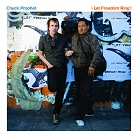
Chuck Prophet Talks London Calling, Fog City, Sings Like Hell
Troubadour Co-Headlines the Lobero this Saturday with Wife Stephanie Finch
Like many of Sings Like Hell’s returning faces, Chuck Prophet embodies the notion of laidback California cool. In conversation, he’s all self-deprecating humor and Dude-like drawl, and in song, he exudes a swagger and Telecaster-heavy reverence for Americana that calls to mind that other Golden State-inspired great, Tom Petty. On Saturday, Prophet returns to the Lobero’s monthly concert series for another go at it, this time with wife-cum-opening act, Stephanie Finch.
While the show is just one of two currently scheduled dates for the San Francisco songwriter, he’s got no shortage of tunes—and stories—to share with fans this time around, namely his recently completed tribute tour to The Clash and a follow-up to his 2009 neo-political rocker, Let Freedom Ring! And though the singer is hesitant to nail down any concrete plans for a new record, he’s more than forthcoming with its details.
So your manager tells me you’re headed into the studio after we speak. Is that right? [Laughs.] I mean, I kind of have a studio that I… I’m always wrestling something to the ground or another, but I don’t think it’s necessarily a full, card-carrying album.
Where are you in the process? I’ve been writing a kind of San Francisco record. I made my last record in Mexico City and the previous one in Nashville, so I’ve just been [trying to] tap into the weirdness and energy and spontaneity that brought me here in the first place. It’s a pretty deep well of stuff to pull from. But I’ve made some demos; I’m kicking the songs around.
Folks called Let Freedom Ring! a “political album for nonpolitical people.” If you had to attach a slogan to what you’re working on now, what w
ould it be? I don’t know if I could come up with anything that clever; that was pretty good, the political music for nonpolitical people. I might have actually started that rumor. I don’t know what I’m doing right now, though. I’m definitely looking backwards through the looking glass. San Francisco’s a place where people come from all over to wave their freak flag. The city itself does a kind of whammy on you when you’re young and you first come here. It’s a feeling that you can sort of end up chasing for the rest of your life, you know? The first hit.
Chuck Prophet, Stephanie Finch, and The Company Men
- Where: Lobero Theatre, 33 E. Canon Perdido St., Santa Barbara
- Cost: $35
- Age limit:Not available
You spent most of last month in Spain with this Clash tribute. Can you tell me a bit about your history with London Calling? I got it as a kid—I was already playing guitar; I was about 16. I didn’t have a library of music. Kids today can seek out any kind of weird culture or weird music that they can identify with, and that’s great, but when I was young, [that album] was a big deal. I bought it used, and at first, I didn’t really crack the code on it, but as I stuck with it, it became more mysterious, really, but every time I listened to it, more was revealed. It really was a perfect record in so many ways. As a kid, I was as interested in Bo Diddley as I was in contemporary music, and it was The Clash that opened that up. They were always one of those bands that had one eye on the road ahead of ’em and one eye on the rearview mirror.
You’ve played the Sings Like Hell series a number of times now. What keeps you coming back? We played it with Alejandro [Escovedo] one time, we played it another time with Kelly Willis, and I think we played it yet another time with The Gourds, so this might be our third or fourth time. I think the theater itself is glorious in its own way. It’s a great setting to hear music, and because it’s a community thing, I think people are more open-minded in a way. With a series, people get turned onto music that they might not normally be aware of. It’s fun in that way.
4•1•1
Chuck Prophet plays the Lobero Theatre (33 E. Canon Perdido St.) this Saturday, February 19, at 8 p.m. with Stephanie Finch & The Company Men. Call 963-0761 or visit singslikehell.com for info.
by
ALY COMINGORE
on
February 16, 2011
SF Gate
Chuck Prophet doing 'London Calling'
San Francisco singer-songwriter Chuck Prophet is fearless. After recording his most recent album, “Let Freedom Ring,” in Mexico City in the midst of the swine flu pandemic, he’s currently out on the road with fellow local musician Chris Von Sneidern performing the Clash’s classic “London Calling” album in its entirety. Their pickup band, Spanish Bombs, plays the Great American Music Hall on Jan. 29, after a brief European tour (a portion of the proceeds from the show will go to the Food Not Bombs organization). We checked in with Prophet recently while the group was making its way across Spain.
Q: You’re covering the Clash’s “London Calling.” The whole thing?
A: Yep. It’s crazy. Figured if the Coen brothers can remake “True Grit,” why not? So we cast it like a movie. I thought, if Chris von Sneidern will do the Mick Jones bits, I’ll do it. I thought I knew the record inside out. It’s a lot more words and chords than I remembered. It’s like learning Shakespeare.
Q: Do you even have to do the songs you don’t like?
A: Oh, yes. I know it’s not exactly the Virgin Mary on toast, but we’re staying true to the record in that respect. We’re not tinkering with the story. We’re not changing the ending. We’re not changing one comma. But we have changed the grooves under the songs’ feet.
Q: Did this idea come about after seeing all the bad ‘80s cover bands sell out shows week after week while actual singer-songwriters struggle to get gigs?
A: Singer-songwriters inhabit a certain ghetto, for sure. It’s not pretty out there. But “London Calling” is nothing to apologize for. Wonky ‘80s nostalgia or not, it really does remind me of why I got into playing music in the first place.
Q: Do you remember buying the record?
A: I do remember buying it. I originally bought the cassette used at Rasputin’s record shop in Pleasant Hill. Listened to it repeatedly. That record is the Rosetta stone of the punk apocalypse. It’s all in there. Figure out the language it’s written in and you’ve got the keys to the highway. I was young. My brain was soft. I soaked it up.
Q: Will you be sporting a Mohawk for the occasion?
A: Probably not the most flattering haircut for me. I’m already a bit long in the face, don’t you think? I mean, why would I want to open myself up to that kind of ridicule?
Q: Do you remember what happened to Pussy Galore after they covered the Rolling Stones’ “Exile on Main Street”? They broke up. How do you plan on breaking up with yourself?
A: I’ve been duct-taped back together so many times already, what does it matter?
Q: What other classic albums do you think you might take on next?
A: “London Calling” is rare. I doubt I’d ever be tempted to do something like this again, but if I did, I wouldn’t pick a double album. {sbox}
To hear Chuck Prophet’s music, go to www.chuckprophet.com.
Follow Aidin Vaziri at twitter.com/MusicSF. E-mail him at href="mailto:">.
This article appeared on page Q - 34 of the San Francisco Chronicle
Read more: http://www.sfgate.com/cgi-bin/article.cgi?f=/c/a/2011/01/15/PKLC1H5O4Q.DTL#ixzz1BniL7RvO
by
Aidin Vaziri
on
January 22, 2011
El Mundo / La Luna (SP)
The American Dream falling down in ugly chunks
Many people considered Let Freedom Ring! your best album, do you agree?
I wanted a sound, a feel. We went to Mexico City. The studio was small. Not enough room to cuss a cat in there, so we crammed our little four piece in and cranked it up loud enough to hear across the border. Live in the studio, Live’R Than You’ll Ever Be. The truth is, it was a struggle. Power outages, fried hard drives, the return of the Black Plague, earthquakes. The American Dream falling down in ugly chunks. It was perfect. Dumb luck, yeah, but it was perfect. It’s an American record. Imaginary. We started with the Swine Flu and we ended up with Michael Jackson dead.
December 24, 2010
Memphis Appeal
CHUCK PROPHET'S ADVENTURES IN MUSIC-MAKING LEAD BACK TO MEMPHIS
By Bob Mehr
Published Tuesday, October 19, 2010
Whether recording in Memphis, Mexico City or various points in between, singer-songwriter Chuck Prophet has always been one to turn the process of making an album into a journey — musical as well as geographic.
The Bay Area-based roots rocker’s ninth, latest and arguably finest solo effort, ¡Let Freedom Ring!, was created during a tumultuous 10-day period south of the border that included power outages, natural disasters and pandemics.
“I am definitely attracted to the adventure of making records. It probably comes from watching too many Werner Herzog movies,” says Prophet, who plays the Hi-Tone Café on Sunday.
Last year, inspired by the 2008 economic crash and the turbulent international climate, Prophet penned a batch of “political songs for non-political people.” He decided to head to Mexico City to make the album, eventually settling on a studio that was “totally state of the art… for 1958,” jokes Prophet.
Prophet and his studio band, which included producer/pedal steel player Greg Leisz and former E Street Band drummer Ernest “Boom” Carter, weathered a series of frustrating technical problems during the recording.
Those issues were merely a teaser to the massive earthquake that rocked the region during the sessions, and the explosion of the swine flu epidemic, which practically shut down the country.
The tension and uncertainty of that experience finds its way onto the record with songs like the cutting “Sonny Liston’s Blues,” and the jagged funk number “Where the Hell Is Henry.” Elsewhere, Freedom finds Prophet dialing back on his cut-and-paste cleverness, and dialing up the guitars and backbeat to brilliant effect.
Although it’s been four years since Prophet’s last appearance in Memphis, he’s no stranger to the Bluff City, having been a frequent visitor through the latter part of the 1980s, when he was wielding a guitar for Los Angeles hell-raisers Green on Red.
For Prophet, a student of the twisted legends, dark underbelly and dusty corners of rock history, Memphis proved to be a perfect place to learn.
“We got signed to a label in England and started working with Jim Dickinson,” recalls Prophet of the late producer. “We cut some stuff in LA but Jim really encouraged us to come to Memphis. We arrived and basically camped out at the Midtown Holiday Inn.”
“At the time,” says Prophet, “there weren’t a lot of people who really had an awareness or appreciation of the history here and what it meant. I mean, when we worked at Ardent (Studios) we wanted to use the Mellotron that was on (Big Star’s) Sister/Lovers album, and they were confused as to why we would even be interested in that.”
After the original Green on Red lineup imploded following the release of 1987’s The Killer Inside Me, Prophet and singer Dan Stuart continued with the group, returning to Memphis to cut the 1989 classic Here Come the Snakes. “Part of that process was going to Sam Phillips Studio and recording ideas and fragments and songs with Jim and (veteran Phillips’ engineer) Roland Janes,” says Prophet.
“I remember being in the studio and meeting Roland in the control room and I innocently asked how many tracks we’d be working with. He said, ‘Well, we’ve got 16 on a good day.’ And then he looked over at the machine and some of the tracks had tape covering the vu meters. ‘Well, we got 14 today,’” says Prophet, laughing.
For Prophet, making music in Memphis was an experience that was at once concrete and ephemeral. “The thing about the air hanging heavier in Memphis and all that, that’s definitely true,” he says.
“There are technical things too. In, Memphis the bass drum, the kick drum is a little bit louder. That’s a taste thing. They’d didn’t go in for things like long fades. It was a classic view. They were classicists in many ways. I mean, Jim was somebody that was into pushing the boundaries. But there was some tradition that always seeped into the way things were done.”
Since transitioning into his own solo career in the early-’90s Prophet has indulged a variety of styles, creating a dazzling mix of albums from 1997’s dark roots opusHomemade Blood to the funky spaced-out blues of 2007’s Soap and Water.
In addition to his own career, Prophet’s proved a prolific foil of late having co-written much of fellow roots rocker Alejandro Escovedo past two LPs. Prophet also produced a new album for his wife and bandmate Stephanie Finch.
As Prophet rolls into town, he’ll be carrying a little bit of Memphis with him. Local musician Paul “Snowflake” Taylor has been manning the drum kit in his backing group, The Mission Express, since earlier in the year. “He’s been a shot in the arm for the band in a lot of ways,” says Prophet. “The secret language of rock and roll — he speaks it fluently.”
After wrapping his current tour and finishing some commitments overseas early next year (where he’ll perform the Clash’s London Calling album in its entirety at Spain’s Primavera Sound Festival), Prophet plans to start work on a new album.
This time, however, he says he won’t be indulging in any far flung adventures. “I’m thinking of making a hometown record, a San Francisco record,” says Prophet. “I’m trying not to leave the neighborhood.”
Chuck Prophet and The Mission Express, The Jeremy Stanfill Band
9 p.m. Sunday at the Hi-Tone Café, 1913 Poplar Ave. Tickets are $10 and are available in advance at hitonememphis.com. For more information, call 278-86
by
By Bob Mehr
on
November 19, 2010
Spinner
Chuck Prophet Takes Portland to 'Bangkok'
Chuck Prophet was already serving up a smoking take on Alex Chilton‘s grimy, hiccuped 1978 single ‘Bangkok’ on the road last winter. Now he plays the Memphis legend’s “painless lesson in geography” (as Prophet called it Friday night at Portland’s Mississippi Studios) in memoriam, five months after Chilton’s death.
“I’m still kind of numb about it,” Prophet told Spinner. “The thing about Alex is he always did take pretty good care of himself. He was one of the first people I knew that was kind of like health-conscious. It’s not the way it’s supposed to turn out.”
Prophet showed off his triple-threat ability—excellent songwriter, killer lead guitarist, charismatic frontman—in Portland, Ore., with a set that included the 20-year-old songs ‘Queen Bee’ and ‘Balinese Dancer,’ as well as crowd-favorites ‘Summertime Thing’ and ‘I Bow Down and Pray to Every Woman I See,’ both from 2002’s ‘No Other Love.’
There was also a solo acoustic version of the title track from Prophet’s current album, ‘Let Freedom Ring,’ and a sweetly soaring version of Alejandro Escovedo‘s ‘Wasn’t I Always a Friend to You,’ which, like many of the songs on Escovedo’s last two records, Prophet co-wrote. It’s also one of the tunes Bruce Springsteen played with Escovedo at the Stone Pony in Asbury Park last month.
“God bless the kid,” Prophet joked. “He’s my meal ticket.”
Prophet also unveiled ‘Hot Talk,’ a “dialogue song” about phone sex.
“If you are bootlegging this show tonight, I would only hope you show us the courtesy we deserve by including this next song,” he told the crowd. “We’ve been locked out of radio.”
by
Posted on Aug 21st 2010 11:56AM by Jason Cohen
on
November 18, 2010
Cincinnati.Com
No faking Prophet's kind of cool
If you can measure a person’s character by the quality of his friends, Chuck Prophet is a lucky man.
The San Francisco singer-songwriter plays the Southgate House in Newport Thursday with one of those friends, Kim Richey. Earlier in the day, they will stop by WNKU-FM (89.7), where music director John Patrick once described Prophet as “the coolest guy we’ve ever had in here.”
Testimonials are nice, but the proof is in the music. Prophet’s latest album, “Let Freedom Ring!” is a meditation on our life and times, somewhat inspired by one his heroes.
“It was Hunter S. Thompson who really based his career on the life, death, rebirth and total disappearing of the American dream,” Prophet says. “I was interested in that when I started writing songs for this album. I had the window open, and after about two or three songs, I realized that’s where I was going.”
In addition to his solo projects, Prophet is a trusted collaborator to folks like Richey and Alejandro Escovedo among others. He co-wrote more than half of the songs on Escovedo’s 2010 “Street Songs of Love” and partnered on every one on 2008’s “Real Animal.”
“When we get in a room, we just never run out of things to talk about,” Prophet says of Escovedo. “It’s like touching two jumper cables together. The songs just kind of spill out of that. To Al’s credit, he has the ability to make somebody feel like you’ve known him your whole life.”
Prophet’s whole life hasn’t been spent basking in a cocoon of critical acclaim. He started living the rock ‘n’ roll lifestyle as a teenager, and fell victim to those temptations. But while he struggled with a drug problem, he also made good music with the band Green on Red, an early acolyte of the country punk sound.
“We really took that lifestyle thing as far we could,” he remembers. “We were working with (Memphis musical legend) Jim Dickinson on a record called ‘The Killer Inside Me,’ which kind of split the band, brother vs. brother.
“While we were there, Alex (Chilton of the Box Tops and Big Star) would drop by. ... Big Star was like the Sex Pistols in their own way ... the influence that it had, just like the influence that the Velvet Underground had, Big Star had the same amount of influence.”
Spending time with Dickinson (who died last year) and Chilton (who died this year) certainly influenced Prophet, but cool innately knows cool.
“The thing about Alex is ... he was cool. He didn’t have to say a lot about (his life and music), and he never did a lot of explaining. There was nothing exaggerated at all. He was the coolest (guy) who ever lived.”
Patrick might disagree. “(Prophet) is just cool. You can’t fake cool.”
by
B Thompson
on
November 17, 2010
City Pages
She was unwanted in 17 state
Chuck Prophet first came to semi-prominence in the mid-‘80s when he joined countrified California rockers Green On Red, and has since pursued a varied career as a singer-songwriter, session man, and producer (Kelly Willis’sTranslated From Love, for instance). His ninth solo album, ¡Let Freedom Ring!, is bar-band rock of a high order: smart, loud, funny, simple, pissed off, but also sentimental in that last-call sort of way. It’s also attuned to Great Recession anxiety and passionately pro-underdog (a typical line: “She was unwanted in 17 states”), most notably on the Randy Newman-meets-Tom Verlaine ballad “You and Me Baby (Holding On),” whose backing harmonies and soaring bridge get me every time. With the Mad Ripple. (Photo by Kelly Stoltz)
Fri., Oct. 15, 8 p.m., 2010
by
Dylan Hicks
on
October 18, 2010
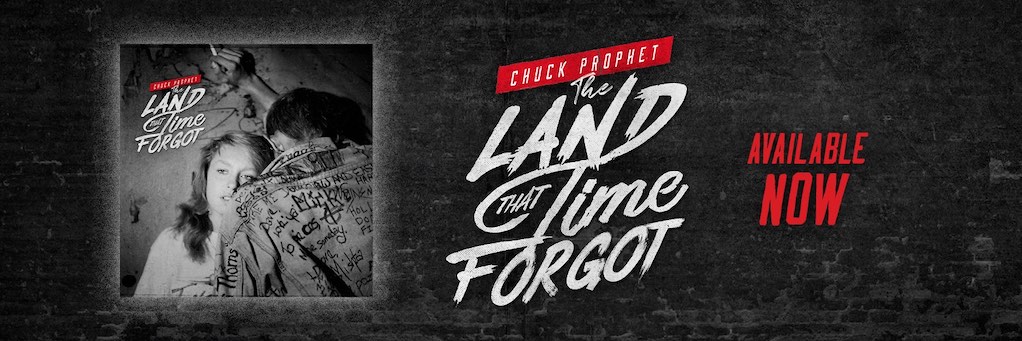





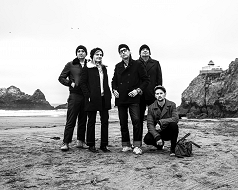
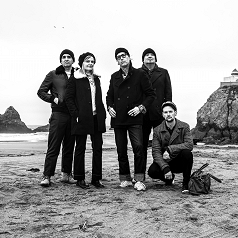
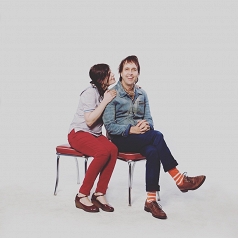
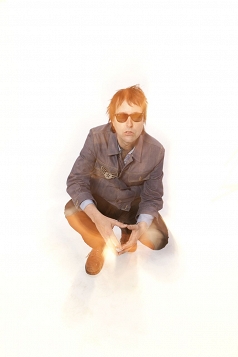

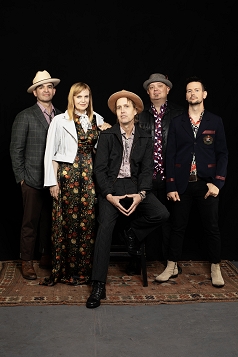
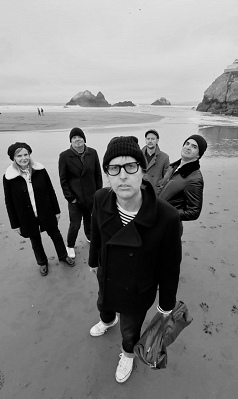
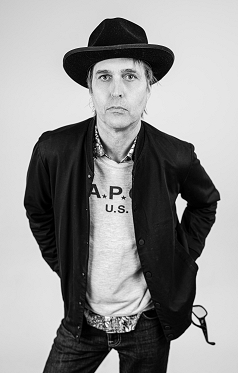
3_238_159auto_s_c1.jpeg)
